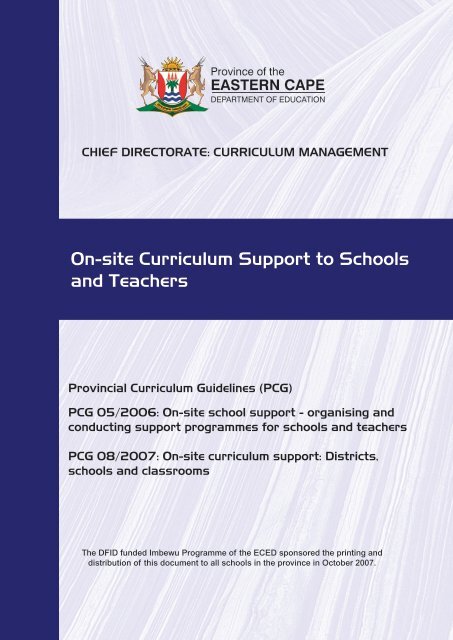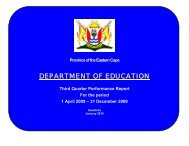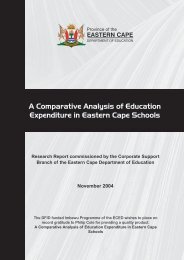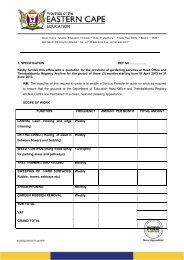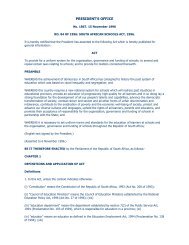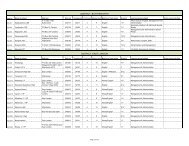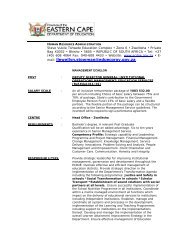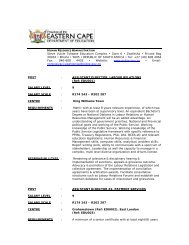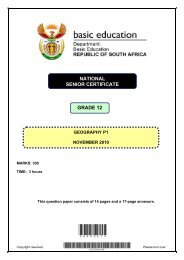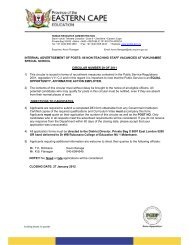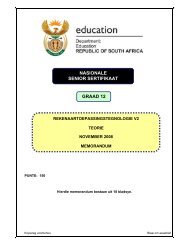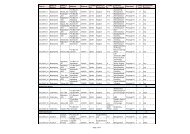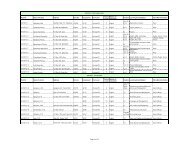On-site Curriculum Support to Schools and Teachers
On-site Curriculum Support to Schools and Teachers
On-site Curriculum Support to Schools and Teachers
Create successful ePaper yourself
Turn your PDF publications into a flip-book with our unique Google optimized e-Paper software.
Province of the<br />
EASTERN CAPE<br />
DEPARTMENT OF EDUCATION<br />
CHIEF DIRECTORATE: CURRICULUM MANAGEMENT<br />
<strong>On</strong>-<strong>site</strong> <strong>Curriculum</strong> <strong>Support</strong> <strong>to</strong> <strong>Schools</strong><br />
<strong>and</strong> <strong>Teachers</strong><br />
Provincial <strong>Curriculum</strong> Guidelines (PCG)<br />
PCG 05/2006: <strong>On</strong>-<strong>site</strong> school support - organising <strong>and</strong><br />
conducting support programmes for schools <strong>and</strong> teachers<br />
PCG 08/2007: <strong>On</strong>-<strong>site</strong> curriculum support: Districts,<br />
schools <strong>and</strong> classrooms<br />
The DFID funded Imbewu Programme of the ECED sponsored the printing <strong>and</strong><br />
distribution of this document <strong>to</strong> all schools in the province in Oc<strong>to</strong>ber 2007.
FOREWORD<br />
The Chief Direc<strong>to</strong>rate: <strong>Curriculum</strong> Management consists of four Direc<strong>to</strong>rates,<br />
namely, <strong>Curriculum</strong> ECD & GET Programmes, <strong>Curriculum</strong> FET & ABET<br />
Programmes, Tele-Collaborative Learning & Technology Education <strong>and</strong><br />
Assessment & Examinations. This Chief Direc<strong>to</strong>rate therefore constitutes the<br />
core business of the Department, that is, teaching, learning <strong>and</strong> assessment.<br />
In order <strong>to</strong> ensure the effective <strong>and</strong> efficient implementation <strong>and</strong> delivery of<br />
curriculum <strong>and</strong> assessment services in the province, the Chief Direc<strong>to</strong>rate has<br />
put in place systems, structures, policies <strong>and</strong> procedures <strong>to</strong> carry out its<br />
m<strong>and</strong>ate. The management systems of the Chief Direc<strong>to</strong>rate are operationalised<br />
through the following structures: The Executive Committee (EXCO), which<br />
consists of Senior Management at the Provincial Head Office, the Management<br />
Committee (MANCOM), which consists of Senior <strong>and</strong> Middle Management at<br />
Head Office, <strong>and</strong> the Provincial <strong>Curriculum</strong> Co-ordinating Committee<br />
(PCCC), which, <strong>to</strong>gether with the MANCOM, includes the 23 District <strong>Curriculum</strong><br />
Chief Education Specialists <strong>and</strong> provides an oversight function in respect of<br />
curriculum implementation throughout the province.<br />
Using the above structures <strong>and</strong> in consultation with provincial curriculum<br />
personnel, the Chief Direc<strong>to</strong>rate has developed a series of Provincial <strong>Curriculum</strong><br />
Guidelines (PCGs) which provide the necessary policy frameworks within which<br />
all curriculum <strong>and</strong> assessment personnel at Head Office <strong>and</strong> Districts operate.<br />
This booklet contains PCG01 <strong>to</strong> PCG11.<br />
Over the years the Chief Direc<strong>to</strong>rate has been challenged in its service delivery,<br />
mainly through the lack of adequate human <strong>and</strong> financial resources. It is here<br />
that the IMBEWU II programme has played a significant supporting role, funding<br />
critical activities of the Chief Direc<strong>to</strong>rate. The hosting of provincial forums for<br />
curriculum personnel by IMBEWU enabled the Chief Direc<strong>to</strong>rate <strong>to</strong> consult<br />
stakeholders in the compilation of the Provincial <strong>Curriculum</strong> Guideline<br />
documents. Moreover, the mass printing of documents was also possible<br />
because of IMBEWU funding. Hence, the Chief Direc<strong>to</strong>rate acknowledges the<br />
significant role played by the DFID sponsored IMBEWU programme in enabling<br />
the delivery of critical curriculum services in our province.<br />
S.P GOVENDER<br />
CHIEF DIRECTOR: CURRICULUM MANAGEMENT<br />
28 SEPTEMBER 2007
TABLE OF CONTENTS<br />
No.<br />
PCG 01<br />
Constitution of the Provincial <strong>Curriculum</strong> Co-ordinating Committee (PCCC)<br />
1<br />
PCG 02<br />
Organising <strong>and</strong> Conducting Workshops<br />
2<br />
PCG 03<br />
Guidelines for Phase Committees <strong>and</strong> Learning Area / Subject Committees<br />
3<br />
PCG 04<br />
Role Functions <strong>and</strong> Responsibilities of <strong>Curriculum</strong> Personnel<br />
4<br />
PCG 05<br />
ON-SITE SCHOOL SUPPORT<br />
Organising <strong>and</strong> Conducting <strong>Support</strong> Programmes for <strong>Schools</strong> <strong>and</strong> <strong>Teachers</strong><br />
5<br />
PCG 06<br />
CONSTITUTION of the Inter-District Assessment <strong>and</strong><br />
Examinations Committee<br />
6<br />
PCG 07<br />
Management <strong>and</strong> Operations Framework for the Assessment <strong>and</strong><br />
Examinations Direc<strong>to</strong>rate<br />
7<br />
PCG 08<br />
<strong>On</strong>-Site <strong>Curriculum</strong> <strong>Support</strong>: Districts, <strong>Schools</strong> <strong>and</strong> Classrooms<br />
8<br />
PCG 09<br />
Script Control Manual<br />
9<br />
PCG 10<br />
Management of Computerized CASS Mark Sheets<br />
10<br />
PCG 11<br />
Provincial Continuous Assessment Policy – Grades 10-12<br />
11
Province of the Eastern Cape<br />
DEPARTMENT OF EDUCATION<br />
ISEBE LEZEMFUNDO<br />
DEPARTEMENT VAN ONDERWYS<br />
Private Bag X0032, BISHO, 5605, SOUTH AFRICA<br />
CHIEF DIRECTORATE: CURRICULUM MANAGEMENT<br />
Provincial <strong>Curriculum</strong> Guidelines<br />
(PCG 05/2006)<br />
ON-SITE SCHOOL SUPPORT<br />
Organising <strong>and</strong> Conducting <strong>Support</strong><br />
Programmes for <strong>Schools</strong><br />
<strong>and</strong> <strong>Teachers</strong><br />
Siyasebenzisana • Working Together • Samewerking<br />
1
Province of the Eastern Cape<br />
DEPARTMENT OF EDUCATION<br />
ISEBE LEZEMFUNDO<br />
DEPARTEMENT VAN ONDERWYS<br />
Private Bag X0032, BISHO, 5605, SOUTH AFRICA<br />
Chief Direc<strong>to</strong>rate: <strong>Curriculum</strong> Management<br />
Siyasebenzisana • Working Together • Samewerking<br />
Provincial <strong>Curriculum</strong> Guidelines: (PCG 05/2006)<br />
ON-SITE SCHOOL SUPPORT<br />
Organising <strong>and</strong> Conducting<br />
<strong>Support</strong> Programmes for <strong>Schools</strong> <strong>and</strong> <strong>Teachers</strong><br />
A. Preamble<br />
1. Provincial <strong>Curriculum</strong> Guideline 05/2006: Organising <strong>and</strong> Conducting<br />
<strong>Support</strong> Programmes for <strong>Schools</strong> <strong>and</strong> <strong>Teachers</strong> (herein referred <strong>to</strong> as PCG<br />
5/2006) is intended <strong>to</strong> formalise the nature, purpose, planning, organisation<br />
<strong>and</strong> implementation of school support visits by curriculum personnel of the<br />
Eastern Cape Department of Education.<br />
2. The document gives substance <strong>to</strong> Role Function 4: To provide teachers with<br />
on-<strong>site</strong> support as described in PCG 04/2005: Role Functions <strong>and</strong><br />
Responsibilities of <strong>Curriculum</strong> Personnel.<br />
3. The primary target audience of PCG 05/2006 is provincial <strong>and</strong> district<br />
curriculum personnel. The recipients of school support are, by implication,<br />
all teachers in Eastern Cape schools.<br />
4. The Work plans <strong>and</strong> Work plan agreements of all curriculum personnel<br />
should reflect aspects of PCG 05/2006.<br />
5. The content of PCG 05/2006 is the result of input obtained from all<br />
provincial curriculum personnel through a consultative process held at the<br />
Education Leadership Institute from 14 -16 February 2006. The final draft<br />
document was then distributed <strong>to</strong> all relevant stakeholders including<br />
Teacher Unions for comment <strong>and</strong> input.<br />
6. The stipulations of PCG 05/2006 contained herein are binding on all<br />
curriculum personnel employed in the Eastern Cape Department of<br />
Education.<br />
2
B. Background<br />
Conducting school support visits is an ongoing developmental process. It involves<br />
supporting teachers in a transparent manner at school <strong>and</strong> classroom level. During<br />
a school support visit, the teaching <strong>and</strong> learning process is supported <strong>and</strong><br />
mechanisms <strong>to</strong> improve teaching strategies are shared. It is also an essential<br />
component for ensuring effective curriculum implementation at classroom level.<br />
C. Principles of school support<br />
The following guiding principles of school support underpin the development of<br />
PCG 05/2006:<br />
School support:<br />
• ensures teacher development <strong>and</strong> support<br />
• Involves transparent <strong>and</strong> democratic processes<br />
• minimises subjectivity through transparency <strong>and</strong> open discussion<br />
with teachers<br />
• emphasises teacher’s feedback <strong>and</strong> reflection as a critical fac<strong>to</strong>r<br />
• recognises good practice as well as areas in need of improvement<br />
• encourages continuous teacher development<br />
D. Purpose of school support<br />
The purpose of conducting school support visits is <strong>to</strong>:<br />
• provide support <strong>to</strong> teachers for continuous growth <strong>and</strong> development<br />
• identify successes <strong>and</strong> challenges in the implementation of the National<br />
<strong>Curriculum</strong> Statement (NCS)<br />
• ensure quality school-based curriculum development that will culminate in<br />
quality teaching <strong>and</strong> learning<br />
• contribute <strong>to</strong> the process of evaluating a teacher’s performance <strong>and</strong> <strong>to</strong><br />
promote accountability.<br />
A core function of curriculum personnel is <strong>to</strong> visit schools <strong>and</strong> support teachers<br />
on a regular basis. In recent years the NCS training workshops became the<br />
primary focus of curriculum personnel <strong>and</strong> this has led <strong>to</strong> a significant lack of<br />
school support programmes. PCG 05/2006 has been developed <strong>to</strong> guide<br />
curriculum personnel in providing on-<strong>site</strong> support <strong>to</strong> teachers.<br />
3
E. Intervention strategies for school support<br />
The purpose of school visits can be achieved by using a variety of intervention<br />
strategies. The table below identifies some of these strategies:<br />
Strategy Description Recommended for…<br />
Demonstration<br />
lesson<br />
Co-operative<br />
planning<br />
Team teaching<br />
Mediating<br />
reflection<br />
(post lesson<br />
focus group<br />
discussions)<br />
Whole-school<br />
workshop<br />
Lesson<br />
observation<br />
A curriculum official or a teacher, who has mastered a<br />
particular skill, delivers a lesson for other teachers in the<br />
school <strong>to</strong> observe. A lesson-debriefing instrument is<br />
developed <strong>to</strong> guide observations. At the end of the<br />
lesson, or at the end of the school day, the curriculum<br />
official engages with teachers in a mini-workshop or<br />
directed discussion about the lesson.<br />
A particular lesson or activity is co-planned with the<br />
curriculum official. In this way, opportunities are created<br />
for planning processes <strong>to</strong> be modelled <strong>and</strong> reinforced. It<br />
builds confidence in teachers as the risk of<br />
implementing a new innovation is shared with the<br />
curriculum official. Co-planning is particularly effective if<br />
it is followed by a team teaching demonstration lesson.<br />
This approach works best when a process of cooperative<br />
planning has preceded the teaching of the<br />
lesson. During the planning stage, specific roles are<br />
allocated. Team teaching works best when the same<br />
lesson is taught <strong>to</strong> more than one class. In this way, it is<br />
possible <strong>to</strong> teach – reflect – revise <strong>and</strong> then teach again.<br />
An approach used for a group of teachers in a school<br />
who have a particular issue or challenge with regard <strong>to</strong><br />
classroom practice, for example, managing a large<br />
class. The curriculum official encourages<br />
experimentation <strong>and</strong> enquiry. Reflections are recorded<br />
<strong>and</strong> shared in a focus group discussion. Effective<br />
strategies <strong>to</strong> deal with the issue are identified <strong>and</strong><br />
implemented.<br />
In some cases school support visits may take the form<br />
of a workshop with the whole staff of the school. For<br />
example, the development of an assessment policy for<br />
the school.<br />
The curriculum official observes a few lessons in the<br />
school. The instrument for observation is agreed in<br />
advance <strong>and</strong> teachers are clear about what will be<br />
discussed afterwards.<br />
…a group of teachers<br />
who are all trying <strong>to</strong><br />
master the same new skill<br />
or method.<br />
…a group of teachers<br />
who are trying <strong>to</strong><br />
implement a new way of<br />
planning <strong>to</strong> best support<br />
the lesson.<br />
…a group of new or<br />
inexperienced teachers<br />
trying out new teaching<br />
methods <strong>and</strong> techniques<br />
or teachers focusing on<br />
specialized areas <strong>and</strong><br />
aspects of a particular<br />
subject/learning area<br />
…a group of teachers<br />
who share a common<br />
issue or challenge about<br />
classroom practice.<br />
…a school that wishes <strong>to</strong><br />
develop its own teaching<br />
<strong>and</strong> learning policies <strong>and</strong><br />
strategies.<br />
… curriculum officials,<br />
subject heads etc. <strong>to</strong><br />
moni<strong>to</strong>r the<br />
implementation of new<br />
skills or teaching<br />
methods, as well as<br />
observing the NCS being<br />
implemented<br />
4
F. District curriculum school-based planning<br />
All school visits should be implemented within the context of a broader district-based<br />
<strong>Curriculum</strong> School <strong>Support</strong> Plan (CSSP). It is the responsibility of the District CES<br />
<strong>Curriculum</strong> <strong>to</strong> co-ordinate the development <strong>and</strong> ongoing maintenance of the plan.<br />
The components of the CSSP should include the following:<br />
1. Data gathering for support<br />
• A clear indication of which curriculum personnel are responsible for which<br />
Phase/Learning Area/Subject/Field<br />
• Biographical data of each teacher per Phase/Learning Area/Subject/Field for<br />
example; age, gender, qualifications, number of years teaching in the<br />
Phase/Learning Area/Subject/Field etc.<br />
• Data on the number of teachers per Phase/Learning Area/Subject/Field<br />
• A structural breakdown of committees at district, circuit, cluster <strong>and</strong> school<br />
level<br />
• The names of the chairperson <strong>and</strong> members of each of the above committees<br />
2. Managing school support<br />
• An overall schedule clearly outlining dates <strong>and</strong> number of visits per curriculum<br />
official. The schedule should be in line with the stipulated number of visits per<br />
curriculum official as per provincial directive<br />
• A record of actual support visits conducted by each curriculum official<br />
• A record of teacher’s needs for the Phase/Learning Area/Subject/Field<br />
• Indica<strong>to</strong>rs for further support needed, for example, where curriculum<br />
implementation deviates from national policies <strong>and</strong> provincial guidelines<br />
• Copies of recording <strong>and</strong> reporting instruments<br />
• Procedures for reporting on school visits<br />
• Procedures for the development of a final report indicating the state of<br />
teaching <strong>and</strong> learning in the district as a result of information obtained from<br />
school visits. The report could make provision for a system <strong>to</strong> grade schools<br />
in terms of the nature <strong>and</strong> scale of support required. In this way, only the most<br />
needy schools will be prioritised for more intensive support.<br />
5
G. The role of the CES, DCES <strong>and</strong> SES in school support<br />
Chief Education Specialist (CES)<br />
Deputy Chief Education Specialist<br />
(DCES)<br />
Senior Education Specialist (SES)<br />
<strong>and</strong> other curriculum officials<br />
PLANNING<br />
Facilitates the development of District CSSP<br />
(ensures integration with overall district plan <strong>and</strong><br />
strategic plan of the provincial department).<br />
Ensures linkages with Management <strong>and</strong><br />
Governance in the acquisition of <strong>and</strong> access <strong>to</strong><br />
essential teacher/school data.<br />
Ensures all necessary data is collected per phase, is<br />
accessible <strong>and</strong> regularly updated.<br />
Draws up a plan of school support visits per Phase.<br />
Plans templates for all necessary data <strong>to</strong> be<br />
collected.<br />
Develops monthly <strong>and</strong> weekly itineraries for<br />
school support visits.<br />
Engages in joint-planning with other curriculum<br />
personnel, for example, <strong>to</strong> arrange transport.<br />
ORGANISING<br />
Ensures budget is available for school visits <strong>to</strong><br />
take place.<br />
Ensures effective communication of programmes.<br />
Advocates the role <strong>and</strong> importance of school visits<br />
at principals’ meetings.<br />
Ensures that stationery, venues, training materials are<br />
available for school visits.<br />
Provide guidance in the development of school visit<br />
<strong>to</strong>ols <strong>and</strong> instruments in conjunction with <strong>Curriculum</strong><br />
SESs.<br />
Evaluates <strong>to</strong>ols developed <strong>and</strong> ensures the <strong>to</strong>ol is<br />
appropriate <strong>to</strong> the nature of the visit.<br />
Ensures effective communication with schools<br />
indicating the time <strong>and</strong> purpose of the school<br />
visit.<br />
Prepares all tasks reflected in respect of the<br />
visit, such as development/refinement of<br />
recording <strong>and</strong> reporting instrument, agendas,<br />
materials development etc.<br />
LEADING<br />
Holds monthly meetings with DCES, SES <strong>to</strong><br />
discuss feedback from school visits.<br />
Prepares reports on school support visits <strong>and</strong><br />
presents <strong>to</strong> SMS, PCCC etc.<br />
Determines the purpose of school visits <strong>and</strong><br />
makes decisions regarding the priortising of<br />
schools for future support.<br />
Holds regular meetings with SES <strong>to</strong> reflect on school<br />
support visits conducted <strong>and</strong> <strong>to</strong> group findings for<br />
further support.<br />
Analyses individual school support reports of SESs<br />
<strong>and</strong> prepares consolidated report for CES.<br />
Visits own sample of schools.<br />
Draws up weekly itineraries <strong>and</strong> submits <strong>to</strong><br />
DCECs.<br />
Visits schools <strong>and</strong> support teachers.<br />
Writes individual school visit reports.<br />
Men<strong>to</strong>rs, supports <strong>and</strong> guides teachers in<br />
identified areas of need.<br />
CONTROLLING<br />
Moni<strong>to</strong>rs the number of school support visits<br />
conducted <strong>and</strong> the findings <strong>to</strong> suggest further<br />
action. Includes school visits in Work Plan <strong>and</strong><br />
Performance Management & Development<br />
Systems (PMDS).<br />
Reviews plan of school support visits every quarter <strong>to</strong><br />
determine outst<strong>and</strong>ing needs; provides feedback <strong>to</strong><br />
CES.<br />
Moni<strong>to</strong>rs implementation of changes in practice<br />
by teachers.<br />
6
H. <strong>Curriculum</strong> SES planning for school-based curriculum support<br />
<strong>Curriculum</strong> officials are required <strong>to</strong> thoroughly prepare for school support visits before,<br />
during <strong>and</strong> after the visit. In this section guidelines are provided for each of these critical<br />
stages of a school support visit.<br />
Determine the purpose for the visit<br />
BEFORE THE VISIT<br />
A clear purpose for each school visit should be determined.<br />
The purpose should be informed by the needs analysis conducted prior <strong>to</strong> the<br />
intended visit or informed by requests from schools/teachers.<br />
All school visits should take place in line with the CSSP. <strong>On</strong>ce-off, ad hoc visits <strong>to</strong><br />
schools should be avoided.<br />
Develop reporting <strong>and</strong> recording instrument<br />
An appropriate recording <strong>and</strong> reporting instrument should be developed by the<br />
curriculum official in support of the purpose identified.<br />
Annexure 1 provides a st<strong>and</strong>ardised instrument that can be used for school support<br />
visits. The annexure provides for the reporting of activities during the school visit. The<br />
recording instruments for classroom observation, audit information, needs analysis<br />
etc. should be developed by the curriculum official in accordance with the specific<br />
purpose of the visit <strong>and</strong> be attached <strong>to</strong> the annexure.<br />
The recording <strong>and</strong> reporting instrument is an important piece of evidence indicating<br />
that the visit has been conducted; it provides critical data on the teaching <strong>and</strong><br />
learning situation in schools <strong>to</strong> inform district planning <strong>and</strong> is critical for reporting<br />
purposes.<br />
Sending notices <strong>to</strong> schools<br />
<strong>Schools</strong> should receive an official notice regarding the intended visit well in<br />
advance.<br />
The purpose of the school support visit should be clearly communicated as well as<br />
the exact date <strong>and</strong> time of the intended visit.<br />
For the purposes of transparency <strong>and</strong> openness, a copy of the recording <strong>and</strong><br />
reporting instrument <strong>to</strong> be used must accompany the notice <strong>to</strong> schools (if<br />
applicable).<br />
Where possible, the curriculum official should make a courtesy telephone call <strong>to</strong> the<br />
principal the day before the intended visit <strong>to</strong> serve as a reminder.<br />
7
Procedures for preliminary interaction<br />
DURING THE VISIT<br />
<strong>On</strong> arrival, the curriculum official should report <strong>to</strong> the principal/deputy principal/HoD<br />
of the school.<br />
A brief meeting should be held with relevant personnel <strong>to</strong> discuss the purpose <strong>and</strong><br />
procedures for the visit.<br />
Procedures for teacher interaction<br />
As far as possible, school visits should include classroom interaction visits.<br />
There are a number of reasons for conducting school visits. Broadly these can be<br />
divided in<strong>to</strong> two main categories, namely moni<strong>to</strong>ring visits <strong>and</strong> support visits.<br />
<strong>Curriculum</strong> visits for moni<strong>to</strong>ring purposes could include:<br />
• To conduct a needs analysis in the Phase/Learning Area/Subject/ <strong>to</strong><br />
determine the needs of teachers in respect of gaps in content<br />
knowledge, teaching methodologies <strong>and</strong> assessment practices.<br />
• To moni<strong>to</strong>r <strong>and</strong> support the implementation of the NCS curriculum <strong>and</strong><br />
its related policies in terms of:<br />
planning systems<br />
classroom management <strong>and</strong> organisation<br />
resource development <strong>and</strong> management<br />
the implementation of lesson plans<br />
assessment<br />
• To initiate, support <strong>and</strong> moni<strong>to</strong>r the implementation of action research<br />
initiatives amongst teachers<br />
• To support <strong>and</strong> moni<strong>to</strong>r LTSM selection, utilisation, <strong>and</strong> management<br />
• To support <strong>and</strong> moni<strong>to</strong>r the implementation of special projects, for<br />
example, Matric Intervention Programme (MIP), NGO initiatives etc.<br />
• To ensure that schools have received <strong>and</strong> are using NCS policy <strong>and</strong><br />
other related policy documents<br />
• To support <strong>and</strong> moni<strong>to</strong>r the implementation of specific assessment <strong>and</strong><br />
examinations issues such as:<br />
compliance with CASS policy<br />
moderation of oral <strong>and</strong> other practical assessments<br />
recording <strong>and</strong> reporting procedures in line with the National<br />
Assessment Pro<strong>to</strong>col<br />
promotion <strong>and</strong> progression procedures <strong>and</strong> exams.<br />
• To visit schools at the beginning of each academic year <strong>to</strong> determine<br />
curriculum readiness <strong>and</strong> whether enabling environments have been<br />
created for teaching <strong>and</strong> learning <strong>to</strong> commence<br />
8
• To support <strong>and</strong> moni<strong>to</strong>r the functionality <strong>and</strong> maintenance of the<br />
following curriculum structures:<br />
Phase/Learning Area/Subject committees<br />
Assessment committee<br />
LTSM committee<br />
School Library committee etc.<br />
Alternatively, schools can be vi<strong>site</strong>d <strong>to</strong> provide specific support such as:<br />
• To conduct on-<strong>site</strong> support training workshops at either individual<br />
school level or school cluster level on identified needs.<br />
• To address specific needs as identified by individual schools<br />
• To address generic aspects of teaching practice such as classroom<br />
management, discipline, dealing with large classes, optimal utilisation<br />
of resources, multi-level/grade teaching etc.<br />
• To establish <strong>and</strong> support the maintenance of curriculum structures in<br />
schools such as Learning Area/Subject/Field committees, Assessment<br />
committee, LTSM committee, School Library committee etc.<br />
• To address teachers needs in terms of:<br />
Planning, assessment <strong>and</strong> classroom implementation<br />
Resource development <strong>and</strong> management<br />
Content knowledge development<br />
Teaching <strong>and</strong> learning methodologies etc.<br />
<strong>On</strong>ce the curriculum official is satisfied that the purpose of the visit has been<br />
achieved, immediate feedback should be provided <strong>to</strong> the relevant personnel<br />
involved.<br />
As far as possible this meeting should take place in a private space <strong>and</strong> must be<br />
conducted professionally.<br />
The curriculum official should remind those involved about the primary purpose of<br />
the visit, work through the recording <strong>and</strong> reporting instrument <strong>and</strong> provide<br />
immediate feedback <strong>and</strong> recommendations <strong>to</strong> teachers.<br />
The interaction should not be one-sided <strong>and</strong> teachers should be given sufficient<br />
opportunity <strong>to</strong> share <strong>and</strong> reflect on their own practice.<br />
The interaction in the feedback meeting should be conducted in an empowering <strong>and</strong><br />
developmental manner, highlighting positive aspects of the teaching <strong>and</strong> learning<br />
situation as well areas requiring improvement (Refer <strong>to</strong> Section C: Principles of<br />
school support). Where possible, practical tips <strong>and</strong> suggestions for improvement<br />
should be provided.<br />
At the end of the meeting, based on the outcome, the curriculum official should<br />
clearly negotiate further intervention procedures. As far as possible, specific dates<br />
for follow up should be established <strong>and</strong> agreed upon before leaving the school.<br />
9
Procedures for final interaction<br />
Ensure that the relevant personnel sign the recording <strong>and</strong> reporting instrument<br />
before leaving the school <strong>and</strong> provide copies, either immediately or at a later stage.<br />
At the end of the visit, return <strong>to</strong> the principal’s office, provide feedback about the<br />
visit, dates for further intervention (where applicable) <strong>and</strong> sign the school’s visi<strong>to</strong>r<br />
book.<br />
AFTER THE VISIT<br />
<strong>On</strong> returning <strong>to</strong> the office, the curriculum official should carefully analyse the<br />
reporting <strong>and</strong> recording instrument.<br />
<strong>On</strong>ce a week the curriculum official should compile a summary of findings <strong>and</strong><br />
trends emerging from school visits.<br />
These trends should then be discussed at Phase/Learning Area/subject meetings<br />
organised by the CES/DCES – all curriculum officials should be present at this<br />
meeting.<br />
The team should decide upon intervention strategies in respect of the findings in<br />
order <strong>to</strong> ensure school visits address the prioritised needs of teachers/schools.<br />
These recommendations should then be reflected in curriculum official’s work plans<br />
for the new academic year thus ensuring school support visits meet the needs of<br />
teachers/schools.<br />
I. Conclusion<br />
The level of curriculum implementation <strong>and</strong> the quality of teaching <strong>and</strong> learning in schools<br />
is best determined by conducting regular visits <strong>to</strong> schools <strong>and</strong> individual classrooms.<br />
Although this may at times be a time-consuming <strong>and</strong> expensive exercise, it is important<br />
that opportunities <strong>to</strong> support teachers at school <strong>and</strong> classroom levels are used optimally.<br />
Hence, PCG 05/2006 provides curriculum personnel with practical guidelines <strong>and</strong><br />
procedures <strong>to</strong> ensure that this can be operationalised.<br />
Whilst budget constraints <strong>and</strong> inadequate staffing are likely <strong>to</strong> pose certain challenges, it is<br />
expected that all curriculum personnel shall embrace <strong>and</strong> action this guideline document. It<br />
is crucial that school support visits begin <strong>to</strong> feature prominently in action plans, work plans<br />
<strong>and</strong> weekly itineraries of curriculum personnel. The Chief Direc<strong>to</strong>rate <strong>Curriculum</strong><br />
Management, at both provincial <strong>and</strong> district levels, must demonstrate a sincere <strong>and</strong> <strong>to</strong>tal<br />
commitment <strong>to</strong> support continuous teacher development, as well as <strong>to</strong> improve the overall<br />
quality of teaching <strong>and</strong> learning in our province.<br />
………………………………………..<br />
SP Govender 30 November 2006<br />
Chief Direc<strong>to</strong>r: <strong>Curriculum</strong> Management<br />
10
Province of the Eastern Cape<br />
DEPARTMENT OF EDUCATION<br />
ISEBE LEZEMFUNDO<br />
DEPARTEMENT VAN ONDERWYS<br />
Private Bag X0032, BISHO, 5605, SOUTH AFRICA<br />
ANNEXURE 1<br />
Chief Direc<strong>to</strong>rate: <strong>Curriculum</strong> Management<br />
Siyasebenzisana • Working Together • Samewerking<br />
ANNEXURE 1: REPORTING AND RECORDING<br />
INSTRUMENT FOR SCHOOL SUPPORT VISITS<br />
Name of District: ……………………………… Date: ………………………………<br />
Name of <strong>Curriculum</strong> Official: …………………………………………<br />
Please indicate the primary purpose of your visit <strong>and</strong> the nature of interaction in the table below:<br />
A. PURPOSE OF THE VISIT<br />
NCS IMPLEMENTATION<br />
NCS Planning<br />
NCS Assessment<br />
PCG 05/2006<br />
Please indicate () if the<br />
primary reason for visit is<br />
for moni<strong>to</strong>ring, support<br />
purposes or both<br />
Purpose of the Visit Moni<strong>to</strong>ring <strong>Support</strong><br />
NCS Classroom implementation<br />
Content knowledge development<br />
CLASSROOM PRACTICE<br />
Teaching <strong>and</strong> learning methodologies<br />
Classroom Management/organisation<br />
Resource development/management<br />
LTSM<br />
Selection/utilisation/management<br />
CURRICULUM COMMITTEES<br />
Establishment/functionality<br />
OTHER<br />
Needs Analysis<br />
Data Collection<br />
Learner support <strong>and</strong> welfare<br />
Not specified above (Please indicate):<br />
…………………………………………………<br />
…………………………………………..........<br />
Please indicate () the nature<br />
of interaction <strong>to</strong> be used<br />
during the visit:<br />
Classroom visit<br />
Demonstration lesson<br />
Co-operative planning<br />
Team teaching<br />
School-based<br />
workshop<br />
Grade<br />
teachers<br />
Phase<br />
SMT<br />
Whole staff<br />
Other (specify)<br />
……………………<br />
Meeting (please<br />
specify):<br />
……………………………<br />
……………………………<br />
Cluster workshop<br />
Presentation<br />
Interview<br />
not specified above<br />
(please indicate)<br />
……………………………<br />
……………………………
B. SCHOOL VISIT INFORMATION<br />
Name of School: ………………………………………. EMIS No. …………………<br />
Name of Principal: ………………………………………….<br />
Name/s of teacher/s vi<strong>site</strong>d:<br />
………………………………………….<br />
………………………………………….<br />
………………………………………….<br />
………………………………………….<br />
………………………………………….<br />
………………………………………….<br />
Name of District <strong>Curriculum</strong> Official: ……………………………………………….<br />
A. SCHOOL VISIT INFORMATION<br />
Designation: SES DCES CES FP IP SP FET <br />
Other (please specify): …………………………<br />
Learning Programme/Learning Area/Subject: …………………………………….<br />
Other (please specify): …………………………<br />
B. OUTCOMES OF SCHOOL VISIT<br />
Section A provides a quick reference as <strong>to</strong> the purpose of the visit <strong>and</strong> the nature of interaction. In this<br />
section, please provide more specific details.<br />
Details of purpose of visit: (be specific, e.g. <strong>to</strong> assist in the development of lesson plans)<br />
Nature of interaction: (indicate sequence e.g. classroom observation, group discussion,<br />
individual meeting etc.)<br />
PCG 05/2006
C. REPORT ON SCHOOL VISIT<br />
Activities<br />
Highlights of Visit (include strengths, positive comments about school/teachers/learners etc.)<br />
Challenges (include specific problems, concerns etc.)<br />
Recommendations/follow up activities (address each challenge identified above <strong>and</strong><br />
indicate strategies as well as timeframes for further assistance)
D. COMMENTS<br />
Teacher/s comments<br />
Teacher/s signature: ………………………………………………………………………….<br />
<strong>Curriculum</strong> Official: Overall Comment<br />
………………………………………<br />
Name of <strong>Curriculum</strong> Official<br />
………………………………………<br />
Signature<br />
School stamp<br />
………………………………………<br />
Name of Principal<br />
………………………………………<br />
Signature<br />
……………………<br />
Date
Province of the<br />
EASTERN CAPE<br />
DEPARTMENT OF EDUCATION<br />
CHIEF DIRECTORATE: CURRICULUM MANAGEMENT<br />
Provincial <strong>Curriculum</strong> Guidelines<br />
(PCG 08/2007)<br />
<strong>On</strong>-Site <strong>Curriculum</strong> <strong>Support</strong>:<br />
Districts, <strong>Schools</strong> <strong>and</strong><br />
Classrooms<br />
Working Together • Siyasebenzisana • Samewerking
Province of the<br />
EASTERN CAPE<br />
DEPARTMENT OF EDUCATION<br />
CHIEF DIRECTORATE: CURRICULUM<br />
MANAGEMENT<br />
Siyasebenzisana• Working <strong>to</strong>gether • Samewerking<br />
Enquiries: Mr. S.P. Govender Tel: 040 608 4435 Date: 20 Oc<strong>to</strong>ber 2007<br />
Provincial <strong>Curriculum</strong> Guidelines: PCG 08/2007<br />
<strong>On</strong>-Site <strong>Curriculum</strong> <strong>Support</strong>: Districts, <strong>Schools</strong> <strong>and</strong> Classrooms<br />
A. Preamble<br />
1. This Guideline document is intended <strong>to</strong> formalise the procedures <strong>and</strong><br />
expectations of <strong>Teachers</strong>, Heads of Departments <strong>and</strong> <strong>Curriculum</strong> Advisors<br />
of Phase <strong>and</strong> Learning Areas/Subjects/Fields during District, School <strong>and</strong><br />
Classroom observation, moni<strong>to</strong>ring <strong>and</strong> support visits.<br />
2. Moreover, it is intended <strong>to</strong> complement PCG 05/2006 entitled “<strong>On</strong>-Site<br />
School <strong>Support</strong>: Organising <strong>and</strong> Conducting <strong>Support</strong> Programmes for<br />
<strong>Schools</strong> <strong>and</strong> <strong>Teachers</strong>”.<br />
3. PCG 08/2007 is a product of deliberations <strong>and</strong> inputs from teachers,<br />
<strong>Curriculum</strong> Advisors <strong>and</strong> Provincial <strong>Curriculum</strong> Planners at the Subject<br />
Advisors meetings held in Port Elizabeth <strong>and</strong> Mthatha on the 7 th - 8 th<br />
February <strong>and</strong> 14 th – 15 th March 2007 respectively.<br />
4. The final draft of this document was circulated <strong>to</strong> Teacher Unions for<br />
comment.<br />
5. The stipulations contained in this document are binding on all curriculum<br />
officials <strong>and</strong> school based personnel employed in the Provincial Education<br />
Department in the Eastern Cape.<br />
Provincial <strong>Curriculum</strong> Guidelines (PCG 08/2007) 1
B. Purpose<br />
This document, PCG 08/2007, is intended <strong>to</strong>:<br />
Facilitate the provision of support <strong>to</strong> teachers <strong>and</strong> assist them <strong>to</strong><br />
implement curriculum effectively.<br />
Ensure ongoing curriculum planning, development, implementation,<br />
moni<strong>to</strong>ring <strong>and</strong> evaluation.<br />
Mediate <strong>and</strong> facilitate Phase <strong>and</strong> Learning Area/Subject curriculum<br />
policies at Provincial, District <strong>and</strong> School levels.<br />
Provide an interface between the National Department of Education<br />
<strong>and</strong> the Province as well as between the Province <strong>and</strong> the Districts.<br />
Assist in determining the level of compliance of the National<br />
<strong>Curriculum</strong> Statement (NCS) at District <strong>and</strong> School level.<br />
Review the impact of curriculum implementation according <strong>to</strong><br />
Provincial <strong>and</strong> National policies.<br />
Ensure remediation so that the quality of teaching <strong>and</strong> learning can<br />
be improved.<br />
C. Rationale<br />
<strong>Curriculum</strong> transformation in South Africa has prompted the need for<br />
constant moni<strong>to</strong>ring <strong>and</strong> evaluation so as <strong>to</strong> inform the methods <strong>and</strong><br />
strategies <strong>and</strong> levels of support <strong>to</strong> districts <strong>and</strong> schools by relevant<br />
officials.<br />
The findings derived from these instruments will serve as indica<strong>to</strong>rs for the<br />
level of compliance in the implementation of the National <strong>Curriculum</strong><br />
Statement (NCS) at District, School <strong>and</strong> Classroom level.<br />
This PCG emphasises the developmental <strong>and</strong> supportive nature of<br />
District, School <strong>and</strong> Classroom visits.<br />
D. Structure of the PCG<br />
There are 3 distinctive <strong>to</strong>ols that constitute the essence of observation,<br />
moni<strong>to</strong>ring <strong>and</strong> support programmes. These are as follows:<br />
1. District Moni<strong>to</strong>ring <strong>and</strong> <strong>Support</strong> Tools:<br />
General Education & Training <strong>Schools</strong> (Annexure 1)<br />
Further Education & Training <strong>Schools</strong> (Annexure 2)<br />
2. A Generic School/School Management Team<br />
Compliance Tool (Annexure 3)<br />
Provincial <strong>Curriculum</strong> Guidelines (PCG 08/2007) 2
3. Classroom Moni<strong>to</strong>ring <strong>and</strong> <strong>Support</strong> Tools:<br />
Early Childhood Development/General Education & Training<br />
(Annexure 4)<br />
Further Education & Training (Annexure 5)<br />
E. Guidelines for the use of the Observation, Moni<strong>to</strong>ring <strong>and</strong> <strong>Support</strong><br />
<strong>to</strong>ols<br />
Provincial <strong>and</strong> District <strong>Curriculum</strong> Officials should administer these <strong>to</strong>ols<br />
when moni<strong>to</strong>ring <strong>and</strong> providing curriculum support <strong>to</strong> District Officials <strong>and</strong><br />
teachers respectively.<br />
The following guidelines should be adhered <strong>to</strong>:<br />
1. As this PCG complements PCG 05/06 which focuses on on-<strong>site</strong><br />
school support, the stipulations contained therein must be complied<br />
with before these <strong>to</strong>ols can be used.<br />
2. Copies of the observation, moni<strong>to</strong>ring <strong>and</strong> support <strong>to</strong>ols must be<br />
issued prior <strong>to</strong> any visit <strong>to</strong> a district, school or classroom.<br />
3. The applicable moni<strong>to</strong>ring <strong>to</strong>ol must be completed in the presence<br />
of the classroom teacher or District <strong>Curriculum</strong> Official being<br />
moni<strong>to</strong>red <strong>and</strong> supported.<br />
4. A copy of the completed, signed <strong>and</strong> dated <strong>to</strong>ol must be given <strong>to</strong><br />
the person being moni<strong>to</strong>red <strong>and</strong> supported, for inclusion in the<br />
individual’s portfolio after the visit.<br />
5. In completing the moni<strong>to</strong>ring <strong>and</strong> support <strong>to</strong>ol, officials should,<br />
where possible, collect copies of supporting evidence of the criteria<br />
listed in the <strong>to</strong>ols <strong>to</strong> inform the written report of the visit.<br />
6. Comments in the relevant column of the <strong>to</strong>ols listed as Annexures<br />
1 - 5, should be written clearly <strong>to</strong> provide comprehensive<br />
information for the compilation of reports.<br />
F. Follow-up strategies <strong>to</strong> be considered after the implementation of the<br />
Moni<strong>to</strong>ring <strong>and</strong> <strong>Support</strong> Tools<br />
The findings from the administered <strong>to</strong>ol can be used for the following<br />
purposes:<br />
Sharing of good practices between institutions<br />
Planning for Professional Development programmes of District<br />
<strong>Curriculum</strong> personnel <strong>and</strong> teachers<br />
Planning for targeted intervention workshops in terms of content,<br />
methodologies <strong>and</strong> classroom practice<br />
Informing the mode of professional development at Provincial,<br />
District <strong>and</strong> School levels<br />
Provincial <strong>Curriculum</strong> Guidelines (PCG 08/2007) 3
G. Conclusion<br />
Informing the cyclic nature of curriculum planning <strong>and</strong> development<br />
Informing the planning <strong>and</strong> development of curriculum issues at<br />
district <strong>and</strong> school level.<br />
School visits conducted by <strong>Curriculum</strong> Officials <strong>to</strong> date have been limited <strong>and</strong><br />
focused mainly on auditing of curriculum structures, curriculum documents,<br />
LTSM <strong>and</strong> workshop attendance. Such visits have therefore not yielded sufficient<br />
information about the levels of implementation of the NCS.<br />
To this end, the PCG 08/2007 is intended <strong>to</strong> supplement the dearth of information<br />
with regard <strong>to</strong> what is actually happening in classrooms in order for <strong>Curriculum</strong><br />
Advisors <strong>to</strong> provide adequate support <strong>to</strong> teachers where necessary.<br />
It is essential that not only school support visits begin <strong>to</strong> feature prominently in<br />
action plans, work plans <strong>and</strong> weekly itineraries of curriculum personnel but also<br />
intensive classroom visits so that teachers can be supported in a practical <strong>and</strong><br />
realistic manner.<br />
This PCG 08/2007 <strong>to</strong>gether with PCG 05/2006 must therefore be used<br />
extensively in the planning <strong>and</strong> execution of classroom moni<strong>to</strong>ring <strong>and</strong> support<br />
visits.<br />
All officials in the Chief Direc<strong>to</strong>rate <strong>Curriculum</strong> Management, at both provincial<br />
<strong>and</strong> district levels, must demonstrate a sincere <strong>and</strong> <strong>to</strong>tal commitment <strong>to</strong> support<br />
continuous teacher development, as well as <strong>to</strong> improve the overall quality of<br />
teaching <strong>and</strong> learning in our province. After all, teachers hold the key <strong>to</strong> the<br />
effective <strong>and</strong> efficient implementation of the National <strong>Curriculum</strong> Statement in our<br />
schools.<br />
…………………………………………………<br />
S.P. Govender 20 Oc<strong>to</strong>ber 2007<br />
Chief Direc<strong>to</strong>r: <strong>Curriculum</strong> Management<br />
Provincial <strong>Curriculum</strong> Guidelines (PCG 08/2007) 4
Province of the ANNEXURE 1: PCG 08/2007<br />
EASTERN CAPE<br />
DEPARTMENT OF EDUCATION<br />
DISTRICT MONITORING AND SUPPORT TOOL<br />
(GET)<br />
NAME OF DISTRICT<br />
PURPOSE OF VISIT<br />
DATE OF VISIT<br />
NUMBER OF PRIMARY SCHOOLS IN THE<br />
DISTRICT:<br />
(GRADES R – 7)<br />
(GRADES 8 – 9)<br />
NAME OF PROVINCIAL CURRICULUM<br />
OFFICIAL(S)<br />
CES<br />
DCES<br />
SES<br />
PART A: MEETINGS WITH CES, DCES, SES, SUBJECT COMMITTEES<br />
CRITERIA : STRUCTURES Y/N COMMENTS<br />
(Describe or make copies of supporting evidence)<br />
1. Have phase / learning area committees<br />
been established?<br />
List committees established<br />
Provincial <strong>Curriculum</strong> Guidelines (PCG 08/2007) 1
List phase / learning areas without<br />
committees<br />
Y/N<br />
COMMENTS<br />
(Describe or make copies of supporting evidence)<br />
2. Is there evidence of existence <strong>and</strong><br />
functioning of committees?<br />
Constitution<br />
Agendas<br />
Minutes<br />
Committee names <strong>and</strong> designations<br />
Correspondence<br />
Other<br />
3. Do the committees have programmes of<br />
action or plans for the term / year?<br />
Phase / learning areas<br />
Improvement Plans<br />
Calendar of events<br />
Timetables<br />
Common Programmes of<br />
Assessment<br />
Evidence of 3 levels of planning<br />
Other<br />
CRITERIA: PLANNING Y/N COMMENTS<br />
(Describe or make copies of supporting evidence)<br />
1. Is there evidence of programmes of<br />
action for Cluster Committees?<br />
Agendas<br />
Minutes<br />
Correspondence<br />
Workshops<br />
2. Do District Officials have evidence of the<br />
following planning documents?<br />
Provincial <strong>Curriculum</strong> Guidelines (PCG 08/2007) 2
Y/N<br />
COMMENTS<br />
(Describe or make copies of supporting evidence)<br />
Workplan Agreements (PMDS)<br />
Schedule <strong>to</strong> moni<strong>to</strong>r schools<br />
Annual Assessment Plan<br />
Schedule <strong>to</strong> moni<strong>to</strong>r CASS<br />
Schedule <strong>to</strong> moni<strong>to</strong>r CTAs<br />
<strong>Support</strong> materials developed for schools<br />
Weekly itineraries<br />
Monthly activity projections<br />
Monthly/quarterly reports<br />
Agendas of section meetings<br />
Minutes of section meetings<br />
Attendance registers<br />
Allocated duties<br />
Commitment registers<br />
Budget planning<br />
Monthly expenditure projections<br />
Asset registers<br />
3. What is the programme of action being<br />
undertaken in the district on day of the<br />
visit?<br />
List details of programme:<br />
Co-ordina<strong>to</strong>r<br />
Budget<br />
Identified outcomes<br />
PART B: MONITORING DISTRICT LEARNER PERFORMANCE<br />
CRITERIA: PLANNING Y/N COMMENTS<br />
(Describe or make copies of supporting evidence)<br />
1. Is there a district plan <strong>to</strong> enhance learners’<br />
performance?<br />
List the objectives<br />
2. Has the district received any<br />
Provincial/National <strong>Support</strong> Materials <strong>to</strong><br />
support teachers <strong>and</strong> learners?<br />
Provincial <strong>Curriculum</strong> Guidelines (PCG 08/2007) 3
Is there a distribution register?<br />
Is there a s<strong>to</strong>rage plan for extra materials?<br />
Y/N<br />
COMMENTS<br />
(Describe or make copies of supporting evidence)<br />
3. List any challenges.<br />
PART C: CASS MODERATION<br />
CRITERIA: PLANNING Y/N COMMENTS<br />
(Describe or make copies of supporting evidence)<br />
1. Is a district programme for<br />
CASS moderation available?<br />
1 st Term<br />
2 nd Term<br />
Provincial Moderation<br />
2. Has the programme been<br />
distributed <strong>to</strong> schools?<br />
1 st Term<br />
2 nd Term<br />
Final Moderation<br />
3. Have clusters for moderation been<br />
established?<br />
No of clusters<br />
No of schools per cluster<br />
Names of schools per cluster<br />
Cluster leaders nominated<br />
<strong>Teachers</strong> trained in CASS<br />
Moderation<br />
• No of workshops<br />
• Workshop programmes<br />
• Attendance registers<br />
• Moderation mark schedules<br />
distributed<br />
Provincial <strong>Curriculum</strong> Guidelines (PCG 08/2007) 4
4. Have the programmes been distributed <strong>to</strong><br />
schools?<br />
Distribution register<br />
Programme displayed in District Office<br />
Programme distributed <strong>to</strong> Management &<br />
Governance<br />
Programme distributed <strong>to</strong> ALL<br />
Senior Education Specialists<br />
Y/N<br />
COMMENTS<br />
(Describe or make copies of supporting evidence)<br />
5. List the names of district officials<br />
responsible for the moni<strong>to</strong>ring of cluster<br />
moderation for each learning area?<br />
Name of official<br />
<br />
<br />
<br />
<br />
<br />
<br />
<br />
<br />
<br />
Learning Area<br />
6. Do schools <strong>and</strong> teachers have copies of<br />
the generic Provincial CASS guideline<br />
document?<br />
7. Do teachers have copies of<br />
Provincial learning area specific<br />
assessment policies?<br />
Provincial <strong>Curriculum</strong> Guidelines (PCG 08/2007) 5
PART D: MONITORING OF CTAs<br />
CRITERIA: PLANNING Y/N COMMENTS<br />
(Describe or make copies of supporting evidence)<br />
1. Is a programme for CTA moni<strong>to</strong>ring in<br />
Grade 9 available?<br />
Have all circuits been included<br />
No of schools moni<strong>to</strong>red<br />
No of rural schools moni<strong>to</strong>red<br />
No of urban schools moni<strong>to</strong>red<br />
No of peri-urban schools moni<strong>to</strong>red<br />
Times of CTAs indicated<br />
Dates of visits indicated<br />
Names of <strong>Curriculum</strong> Advisors<br />
indicated<br />
Are all <strong>Curriculum</strong> Advisors represented<br />
on the dates their learning areas are<br />
being written<br />
Co-ordina<strong>to</strong>r nominated for coordination<br />
of reports<br />
CRITERIA: IMPLEMENTATION<br />
1. Has the programme been distributed <strong>to</strong><br />
schools?<br />
Distribution register<br />
2. Is the Provincial CTA moni<strong>to</strong>ring<br />
<strong>to</strong>ol available <strong>to</strong> moni<strong>to</strong>ring district<br />
personnel?<br />
Have all schools seen the moni<strong>to</strong>ring<br />
<strong>to</strong>ol<br />
Distribution register<br />
Training of District personnel in<br />
administering the <strong>to</strong>ol<br />
Attendance register<br />
3. What reporting strategies are in place<br />
for district personnel during <strong>and</strong> after<br />
moni<strong>to</strong>ring CTAs?<br />
Provincial <strong>Curriculum</strong> Guidelines (PCG 08/2007) 6
Is there a district co-ordina<strong>to</strong>r<br />
To whom are reports submitted<br />
Frequency of submitting reports<br />
Y/N<br />
COMMENTS<br />
(Describe or make copies of supporting evidence)<br />
CHALLENGES:<br />
COMMENTS BY DISTRICT OFFICIALS:<br />
COMMENTS & RECOMMENDATIONS BY PROVINCIAL OFFICIALS:<br />
_____________________________ ______ _ _________________ ______<br />
NAME: DISTRICT CURRICULUM OFFICIAL SIGNATURE DATE<br />
_____________________________ _________ _________________ ______<br />
NAME: PROVINCIAL CURRICULUM OFFICIAL SIGNATURE DATE<br />
DISTRICT STAMP<br />
Provincial <strong>Curriculum</strong> Guidelines (PCG 08/2007) 7
Province of the ANNEXURE 2: PCG 08/2007<br />
EASTERN CAPE<br />
DEPARTMENT OF EDUCATION<br />
DISTRICT MONITORING AND SUPPORT TOOL<br />
(FET)<br />
NAME OF DISTRICT<br />
PURPOSE OF VISIT<br />
DATE OF VISIT<br />
NUMBER OF SECONDARY SCHOOLS IN THE<br />
DISTRICT:<br />
(GRADES 8 – 9)<br />
(GRADES 10 – 12)<br />
NAME OF PROVINCIAL CURRICULUM<br />
OFFICIAL(S)<br />
CES<br />
DCES<br />
SES<br />
PART A: MEETINGS WITH CES, DCES, SES, SUBJECT COMMITTEES<br />
CRITERIA : STRUCTURES Y/N COMMENTS<br />
(Describe or make copies of supporting<br />
evidence)<br />
1. Have subject committees<br />
been established?<br />
List committees established<br />
List subjects without committees<br />
Provincial <strong>Curriculum</strong> Guidelines (PCG 08/2007) 1
Y/N<br />
COMMENTS<br />
(Describe or make copies of supporting<br />
evidence)<br />
2. Is there evidence of existence <strong>and</strong><br />
functioning of subject committees?<br />
Constitution<br />
Agendas<br />
Minutes<br />
Committee names <strong>and</strong> designations<br />
Correspondence<br />
Other<br />
3. Do the subject committees have programmes of<br />
action or plans for the term / year?<br />
Subject Improvement Plans<br />
Calendar of events<br />
Timetables<br />
Common Programmes of<br />
Assessment<br />
Evidence of 3 levels of planning?<br />
Other<br />
CRITERIA: PLANNING<br />
1. Is there evidence of programmes of<br />
action for Cluster Committees?<br />
Agendas<br />
Minutes<br />
Correspondence<br />
Workshops<br />
Other … (Specify)<br />
Provincial <strong>Curriculum</strong> Guidelines (PCG 08/2007) 2
Y/N<br />
COMMENTS<br />
(Describe or make copies of supporting<br />
evidence)<br />
2. Do District Officials have evidence of the<br />
following planning documents?<br />
Workplan Agreements (PMDS)<br />
Schedule <strong>to</strong> moni<strong>to</strong>r schools<br />
Annual Assessment Plan<br />
Schedule <strong>to</strong> moni<strong>to</strong>r CASS<br />
Schedule <strong>to</strong> moni<strong>to</strong>r<br />
Examinations / CTAs<br />
<strong>Support</strong> materials developed for schools<br />
Weekly itineraries<br />
Monthly activity projections<br />
Monthly/quarterly reports<br />
Agendas of section meetings<br />
Minutes of section meetings<br />
Attendance registers<br />
Allocated duties<br />
Commitment registers<br />
Budget planning<br />
Monthly expenditure projections<br />
Asset registers<br />
3. What is the programme of action being<br />
undertaken in the district on day of the<br />
visit?<br />
List details of programme:<br />
Co-ordina<strong>to</strong>r<br />
Budget<br />
Identified outcomes<br />
Provincial <strong>Curriculum</strong> Guidelines (PCG 08/2007) 3
PART B: MONITORING LEARNER PERFORMANCE<br />
CRITERIA: PLANNING Y/N COMMENTS<br />
(Describe or make copies of supporting<br />
evidence)<br />
1. Is there a district plan <strong>to</strong> enhance learners’<br />
performance?<br />
List the objectives<br />
2. What evidence is there of extra classes<br />
in schools with pass rates below 60% in<br />
the subject?<br />
List of centres<br />
List of tu<strong>to</strong>rs<br />
Distribution register for LTSM<br />
Learner registration forms<br />
Timetable<br />
Moni<strong>to</strong>ring timetable<br />
3. Has the district received any<br />
Provincial/National <strong>Support</strong> Materials <strong>to</strong><br />
support teachers <strong>and</strong> learners?<br />
Distribution register<br />
S<strong>to</strong>rage plan for extra<br />
materials<br />
4. List any challenges.<br />
Provincial <strong>Curriculum</strong> Guidelines (PCG 08/2007) 4
PART C: CASS MODERATION AND ORAL MODERATION<br />
CRITERIA: PLANNING Y/N COMMENTS<br />
(Describe or make copies of supporting<br />
evidence)<br />
1. Is a district programme for<br />
CASS moderation available?<br />
1 st Term<br />
2 nd Term<br />
Provincial Moderation<br />
2. Has the programme been<br />
distributed <strong>to</strong> schools?<br />
1 st Term<br />
2 nd Term<br />
Final Moderation<br />
3. Have clusters for moderation been<br />
established?<br />
No of clusters<br />
No of schools per cluster<br />
Names of schools per cluster<br />
Cluster leaders nominated<br />
<strong>Teachers</strong> trained in CASS<br />
Moderation<br />
• No of workshops<br />
• Workshop programmes<br />
• Attendance registers<br />
• Moderation mark schedules<br />
distributed<br />
4. Is a programme for Grade 10 - 12 oral<br />
moderation available?<br />
Oral moderation mark schedules<br />
distributed<br />
Provincial <strong>Curriculum</strong> Guidelines (PCG 08/2007) 5
Y/N<br />
COMMENTS<br />
(Describe or make copies of supporting<br />
evidence)<br />
5. Have the programmes been distributed<br />
<strong>to</strong> schools?<br />
Distribution register<br />
Programme displayed in District Office<br />
Programme distributed <strong>to</strong> Management <strong>and</strong><br />
Governance Sub-direc<strong>to</strong>rate<br />
Programme distributed <strong>to</strong> ALL<br />
Senior Education Specialists<br />
6. Have clusters for oral moderation been<br />
established?<br />
No of clusters<br />
No of schools per cluster<br />
Names of schools per cluster<br />
Cluster leaders nominated<br />
<strong>Teachers</strong> trained in CASS Oral<br />
Moderation<br />
• No of workshops<br />
• Workshop programmes<br />
• Attendance registers<br />
7. Have the appropriate district personnel<br />
been allocated languages <strong>to</strong> moderate<br />
according <strong>to</strong> expertise?<br />
List names:<br />
• English<br />
• Afrikaans<br />
• isiXhosa<br />
• Other … (Specify)<br />
Provincial <strong>Curriculum</strong> Guidelines (PCG 08/2007) 6
Y/N<br />
COMMENTS<br />
(Describe or make copies of supporting<br />
evidence)<br />
8. List the names of district officials<br />
responsible for the moni<strong>to</strong>ring of cluster<br />
moderation for each subject offered in<br />
the district?<br />
Name of official<br />
•<br />
•<br />
•<br />
•<br />
•<br />
•<br />
•<br />
•<br />
•<br />
Subject<br />
9. Do schools <strong>and</strong> teachers have copies of<br />
the generic Provincial CASS guideline<br />
document?<br />
10. Do subject teachers have copies of<br />
Provincial subject specific CASS<br />
policies?<br />
PART D: EXAMINATION MONITORING<br />
CRITERIA: PLANNING Y/N COMMENTS<br />
(Describe or make copies of supporting<br />
evidence)<br />
1. Is a programme for annual examination<br />
moni<strong>to</strong>ring in various grades available?<br />
• Have all circuits been included<br />
• No of schools moni<strong>to</strong>red<br />
• No of rural schools moni<strong>to</strong>red<br />
Provincial <strong>Curriculum</strong> Guidelines (PCG 08/2007) 7
Y/N<br />
COMMENTS<br />
(Describe or make copies of supporting<br />
evidence)<br />
• No of urban schools moni<strong>to</strong>red<br />
• No of peri-urban schools moni<strong>to</strong>red<br />
• Times of examination indicated<br />
• Dates of visits indicated<br />
• Names of Subject advisors indicated<br />
• Are all Subject Advisors represented on the<br />
dates their subjects are being written<br />
• Co-ordina<strong>to</strong>r nominated for co-ordination of<br />
reports<br />
CRITERIA: IMPLEMENTATION Y/N COMMENTS (Describe or make copies of<br />
supporting evidence)<br />
1. Has the Examination Moni<strong>to</strong>ring Programme been<br />
distributed <strong>to</strong> schools?<br />
• Distribution register<br />
2. Is the Provincial examination moni<strong>to</strong>ring<br />
<strong>to</strong>ol available <strong>to</strong> district personnel?<br />
• Have all schools seen the moni<strong>to</strong>ring <strong>to</strong>ol<br />
• Distribution register<br />
• Training of District personnel in<br />
administering the <strong>to</strong>ol<br />
• Attendance register<br />
3. What reporting strategies are in place<br />
for district personnel during <strong>and</strong> after<br />
moni<strong>to</strong>ring exams?<br />
• Is there a district co-ordina<strong>to</strong>r<br />
• To whom are reports submitted<br />
• Frequency of submitting reports<br />
Provincial <strong>Curriculum</strong> Guidelines (PCG 08/2007) 8
CHALLENGES:<br />
COMMENTS BY DISTRICT OFFICIALS:<br />
COMMENTS & RECOMMENDATIONS BY PROVINCIAL OFFICIALS:<br />
_____________________________ _____ _________________ _____<br />
NAME: DISTRICT CURRICULUM OFFICIAL SIGNATURE DATE<br />
_____________________________ ____ _________________ _____<br />
NAME: PROVINCIAL CURRICULUM OFFICIAL SIGNATURE DATE<br />
DISTRICT STAMP<br />
Provincial <strong>Curriculum</strong> Guidelines (PCG 08/2007) 9
Province of the ANNEXURE 3: PCG 08/2007<br />
EASTERN CAPE<br />
DEPARTMENT OF EDUCATION<br />
FET CLASSROOM SCHOOL SUPPORT MONITORING AND MONITORING AND SUPPORT TOOL<br />
TOOL: GET & FET SCHOOLS<br />
NAME OF<br />
PRINCIPAL<br />
NAM E OF<br />
EDO<br />
CONTACT<br />
NUMBERS<br />
SCHOOL<br />
POSTAL<br />
ADDRESS<br />
FAX NUMBER<br />
DISTRICT<br />
EMIS NO<br />
CELL<br />
LEARNING<br />
AREA(S)<br />
LEARNING<br />
PROGRAMMS<br />
SUBJECT(S)<br />
NAME(S) OF<br />
PROVINCIAL/<br />
DISTRICT<br />
CURRICULUM<br />
OFFICIAL(S)<br />
DATE<br />
NUMBER OF<br />
LEARNERS PER<br />
GRADE/ PHASE/<br />
SUBJECT<br />
Provincial <strong>Curriculum</strong> Guidelines (PCG 08/2007) 1
INSTRUMENT TO MONITOR AND SUPPORT SCHOOL COMPLIANCE OF<br />
NATIONAL CURRICULUM STATEMENT (NCS) AND LEARNER ATTAINMENT<br />
IMPROVEMENT STRATEGY (LAIS)<br />
TARGET GROUP: SCHOOL MANAGEMENT TEAM (SMT) GET & FET<br />
SCHOOLS<br />
CRITERIA Y/N EVIDENCE AND COMMENTS /<br />
RECOMMENDATIONS<br />
1. PLANNING<br />
1.1 Do all teachers have portfolios which reflect the<br />
three levels of planning?<br />
• Learning Programme<br />
• Work Schedule<br />
• Lesson Plans<br />
1.2 Do all learners have portfolios which reflect their<br />
accomplishments?<br />
1.3 Is there a Programme of Assessment?<br />
• School level<br />
• Phase/grade level<br />
• Phase/Learning area/subject<br />
level<br />
1.4 Does the school management have a clear<br />
moderation <strong>and</strong> supervision policy?<br />
1.5 Is the moderation programme available?<br />
1.6 Is there evidence of internal/school based<br />
moderation (SBA)?<br />
1.7 Is there a year planner for extra/ co- curricular<br />
activities?<br />
1.8 Is there evidence of a filing system for<br />
Assessment Instructions?<br />
1.9 Are examination timetables (school <strong>and</strong><br />
provincial) <strong>and</strong>/or CTA timetables displayed?<br />
Provincial <strong>Curriculum</strong> Guidelines (PCG 08/2007) 2
1.10 Is there evidence of a filing system for Policy<br />
documents?<br />
Y/N EVIDENCE AND COMMENTS /<br />
RECOMMENDATIONS<br />
2. TIME TABLE<br />
2.1<br />
ECD/GET:<br />
Does the timetable reflect the prescribed time<br />
allocation for each Learning Programme, Learning<br />
Area as articulated in the ncs policy?<br />
FET:<br />
Does the timetable reflect subjects as articulated<br />
by policy i.e. 4 compulsory subjects <strong>and</strong> 3 electives<br />
from list B?<br />
• Reflection of NCS subjects in compo<strong>site</strong><br />
time table?<br />
• Reflection of minimum of 27.5 hours per<br />
subject per week?<br />
• Individual teacher timetables<br />
2.2 Is the timetable drawn in accordance with NCS<br />
requirements <strong>and</strong> appropriate NCS terminology?<br />
2.3 Is the timetable clearly drawn <strong>and</strong> placed in<br />
strategic places?<br />
2.4 Does the timetable reflect appropriate weighting<br />
per phase?<br />
2.5 Is there a copy of the Subject/Learning Area<br />
allocation <strong>to</strong> teachers available?<br />
2.6 Have the teachers been equitably <strong>and</strong><br />
appropriately allocated according <strong>to</strong> qualifications<br />
<strong>and</strong> expertise?<br />
3. TEACHING AND LEARNING ENVIRONMENT<br />
3.1 Are the classrooms designed <strong>to</strong> cater for the age<br />
level?<br />
Provincial <strong>Curriculum</strong> Guidelines (PCG 08/2007) 3
3.2 Is the furniture appropriate <strong>to</strong> the age level?<br />
Y/N EVIDENCE AND COMMENTS /<br />
RECOMMENDATIONS<br />
3.3 Does the seating arrangement allow for group<br />
work <strong>and</strong> free movement?<br />
3.4 Does the classroom have a chalkboard?<br />
3.5 What other (if any) equipment is available in the<br />
classrooms?<br />
3.6 If there is a Grade R classroom, is the layout<br />
suitable for teaching <strong>and</strong> learning in Grade R?<br />
3.7 Is there an outdoor area with outdoor equipment<br />
for Grade R learners?<br />
3.8 Is there a school library?<br />
3.9 If the school offers CAT/IT at FET level, does it<br />
have a computer labora<strong>to</strong>ry with the minimum<br />
requirements as stipulated by policy?<br />
3.10 If the school offers Consumer Studies at FET<br />
level does it have a designated<br />
kitchen/classroom with the minimum<br />
requirements as stipulated by policy?<br />
3.11 Does the school have a Physical Science/Life<br />
Sciences labora<strong>to</strong>ry?<br />
4. ADMINISTRATION<br />
4.1 How is the <strong>to</strong>ne/ethos of the school conducive<br />
for teaching <strong>and</strong> learning?<br />
4.2 Has the school been involved in vision crafting?<br />
4.3 Is there a mission statement <strong>and</strong> a vision<br />
statement?<br />
4.4 Are vision <strong>and</strong> mission statements prominently<br />
displayed?<br />
Provincial <strong>Curriculum</strong> Guidelines (PCG 08/2007) 4
4.5 How are the principles of values <strong>and</strong> human<br />
rights upheld by the school?<br />
Y/N EVIDENCE AND COMMENTS /<br />
RECOMMENDATIONS<br />
4.6 Does the school have a School Management<br />
Team (SMT)?<br />
4.7 Does the school have a governing body?<br />
4.8 Is there a system of recording the minutes of<br />
meetings held by the SMT?<br />
4.9 Is there an attendance register for<br />
teachers/educa<strong>to</strong>rs?<br />
4.10 Is learner attendance moni<strong>to</strong>red?<br />
4.11 Is there evidence of Learner Profiles?<br />
4.12 Is there evidence of learner class lists?<br />
4.13 Are all teachers registered with SACE?<br />
5. CONTINUOUS ASSESSMENT (CASS)<br />
5.1 Does the school know <strong>to</strong> which cluster it<br />
belongs?<br />
5.2 Does the teacher’s master portfolio show<br />
evidence of School Based Moderation (SBA)<br />
level 1?<br />
5.3 Does the 10% evidence of Learners’ work show<br />
evidence of SBA (Level 1)?<br />
5.4 Is the 10% evidence of Learners’ work properly<br />
sequenced <strong>to</strong> correlate with the Programme of<br />
Assessment <strong>and</strong> the Master Portfolio?<br />
5.5 Is the teacher’s master portfolio properly<br />
organized?<br />
Provincial <strong>Curriculum</strong> Guidelines (PCG 08/2007) 5
5.6 Has the teacher a 10% sample of the class work<br />
ready for District Cluster moderation?<br />
Y/N EVIDENCE AND COMMENTS /<br />
RECOMMENDATIONS<br />
5.7 Do the schools have the District Oral Moderation<br />
programme?<br />
5.8 Have all oral tasks been completed?<br />
5.9 Have the oral marks been transferred on<strong>to</strong> the<br />
computer mark sheets correctly?<br />
5.10 Have the marks been transferred correctly <strong>and</strong><br />
counter-checked by the HOD or Principal?<br />
5.11 Have all CASS/Oral mark schedules been<br />
completed in duplicate?<br />
5.12 Have all CASS/Oral mark schedules been duly<br />
signed by class teacher, HOD <strong>and</strong> Principal?<br />
5.13 Have CASS/Oral mark schedules been stamped<br />
with an original school stamp?<br />
6. EXAMINATION / CTA ADMINISTRATION<br />
6.1 Does the school have the Provincial/District<br />
timetable for CTA administration <strong>and</strong> Common<br />
Examinations?<br />
6.2 Is there an invigilation timetable available?<br />
6.3 Is there evidence of mid-year/trial examinations<br />
for subjects not on the Provincial/District timetable?<br />
6.4 Is there a timetable for common examinations?<br />
6.5 Do internally set tests/examinations have<br />
memor<strong>and</strong>a available?<br />
Provincial <strong>Curriculum</strong> Guidelines (PCG 08/2007) 6
6.6 Is there evidence that examination papers/CTAs<br />
are controlled before <strong>and</strong> after the<br />
examination/CTA is written?<br />
Y/N EVIDENCE AND COMMENTS /<br />
RECOMMENDATIONS<br />
6.7 Has the school initiated any extra-tuition for<br />
learners <strong>to</strong> prepare them for<br />
examinations/CTAs?<br />
6.8 Does the school ensure that subject moderation<br />
processes are in place for all examinations?<br />
7. LEARNER PROGRESSION AND PROMOTION<br />
7.1 Is there evidence of recording of learner<br />
performance?<br />
• In Teacher portfolios/mark books<br />
• In Principal’s office<br />
7.2 Does each Learning Area/Subject teacher record<br />
learner’s performance according <strong>to</strong> a<br />
Programme of Assessment?<br />
7.3 Is there evidence of recorded daily tasks?<br />
7.4 Is there evidence of mark lists/ progression/<br />
promotion schedules?<br />
7.5 Is there evidence that these schedules are<br />
submitted <strong>to</strong> EDOs timeously?<br />
7.6 Are reporting systems in place?<br />
7.7 Do the reporting systems reflect NCS rating<br />
scales?<br />
7.8 Are the learners retained according <strong>to</strong> policy?<br />
7.9 Are there any learner assistance programmes?<br />
7.10 Are there any referral systems?<br />
Provincial <strong>Curriculum</strong> Guidelines (PCG 08/2007) 7
7.11 Are the progressions / promotions conducted<br />
according <strong>to</strong> policy?<br />
Y/N EVIDENCE AND COMMENTS /<br />
RECOMMENDATIONS<br />
7.12 Are grade 9/12 failures counseled in alternative<br />
ways of achieving a Senior or General Education<br />
Certificate?<br />
8. CURRICULUM STRUCTURES<br />
8.1<br />
Are Phase/ Learning Areas/ Subject Committees<br />
in place?<br />
8.2 Do they have plans of activities?<br />
8.3 Is the Assessment Committee in place?<br />
8.4 Does the school have an LTSM<br />
Committee?<br />
8.5 Are there any other structures that enhance the<br />
process of teaching <strong>and</strong> learning?<br />
8.6 Has the school “twinned” with another school <strong>to</strong><br />
share experiences <strong>and</strong> expertise?<br />
9. PROFESSIONAL DEVELOPMENT<br />
9.1<br />
Does the school have a professional<br />
development plan?<br />
Is the school in possession of all relevant<br />
<strong>Curriculum</strong> Policies?<br />
• Learning Area Statement for<br />
Grades R <strong>to</strong> 9<br />
• Learning Area Assessment<br />
Guidelines<br />
Provincial <strong>Curriculum</strong> Guidelines (PCG 08/2007) 8
• Government Gazette on<br />
Assessment Feb 07 no 29626<br />
Y/N EVIDENCE AND COMMENTS /<br />
RECOMMENDATIONS<br />
• White Paper 05:<br />
• White Paper 06: Inclusive Education<br />
• White Paper 07: E-Education<br />
• Language in Education Policy<br />
• HIV/AIDS Policy<br />
• National <strong>Curriculum</strong> Statements<br />
(Grades 10-12)<br />
• Learning Programme Guidelines<br />
(LPGs)<br />
• Subject Assessment Guidelines<br />
(SAGs)<br />
• Provincial CASS policy document<br />
• Provincial subject specific CASS policy<br />
documents<br />
• Oral Moderation Document<br />
• National Pro<strong>to</strong>col on Assessment<br />
• Provincial <strong>Curriculum</strong> Guideline<br />
Documents<br />
• INSET modules<br />
• Assessment Instructions<br />
9.2 Are teachers members of any professional<br />
organization e.g. AMESA?<br />
9.3 Do teachers participate in National Teaching<br />
Awards (NTA) programme<br />
Provincial <strong>Curriculum</strong> Guidelines (PCG 08/2007) 9
Y/N EVIDENCE AND COMMENTS /<br />
RECOMMENDATIONS<br />
10. CO-CURRICULA ACTIVITIES<br />
10.1 Does the school have a co-curricular<br />
schedule or time table?<br />
10.2 Does the school participate in extra/ cocurriculum<br />
activities like Maths/ Science<br />
Olympiads?<br />
10.3 Does the school participate in the National<br />
Productivity Institute Debating competition?<br />
10.4 Does the school participate in the Young<br />
Communica<strong>to</strong>rs Awards Public Speaking<br />
competition?<br />
10.5 Does the school participate in National<br />
Celebration Days e.g. Heritage Day, Arbor<br />
Week etc (His<strong>to</strong>ry <strong>Curriculum</strong> Statement)?<br />
10.6 Does the school promote Oral His<strong>to</strong>ry in terms<br />
of requirements of the His<strong>to</strong>ry <strong>Curriculum</strong>?<br />
10.7 Does the school have a sports programme?<br />
• List sporting codes offered<br />
10.8 Does the school participate in local, district <strong>and</strong><br />
provincial sporting competition/leagues?<br />
10.9 Does the school have access <strong>to</strong> sports<br />
equipment necessary for the codes offered at<br />
the school?<br />
11. LEARNER ATTAINMENT IMPROVEMENT STRATEGY (LAIS)<br />
11.1 Does the school have a School Improvement<br />
Plan (SIP)?<br />
11.2 Is there evidence of the SIP being<br />
implemented for the school as a whole?<br />
Provincial <strong>Curriculum</strong> Guidelines (PCG 08/2007) 10
11.3 Are Subject Improvement Plans (SIP)<br />
available?<br />
Y/N EVIDENCE AND COMMENTS /<br />
RECOMMENDATIONS<br />
11.4 Is there evidence of the SIP being used by<br />
teachers in classrooms?<br />
11.5 Is there evidence of a Learner Attainment<br />
Improvement Strategy for the school?<br />
11.6 Is there evidence of LAIS being implemented<br />
at the school?<br />
11.7 Does the school have a Matric Improvement<br />
Strategy?<br />
11.8 Does the school participate in the Common<br />
exams for Grade 12 in June/September?<br />
11.9 Are there remedial measures undertaken<br />
based on the analysis of these results?<br />
11.10 Are additional lessons conducted outside<br />
normal instructional hours, <strong>to</strong> support<br />
learners? Specify.<br />
Provincial <strong>Curriculum</strong> Guidelines (PCG 08/2007) 11
CHALLENGES<br />
COMMENTS BY PRINCIPAL<br />
COMMENTS & RECOMMENDATIONS BY PROVINCIAL / DISTRICT OFFICIAL<br />
PRINCIPAL’S NAME: ______________________ SIGNATURE: _________________________<br />
DATE: ___________ ______________________<br />
DISTRICT OFFICIAL’S NAME: ______________<br />
SIGNATURE: _______________________<br />
DATE: _________________________________<br />
PROVINCIAL OFFICIAL’S NAME: _____________ SIGNATURE:_________________________<br />
DATE: ____________________________________<br />
SCHOOL STAMP<br />
Provincial <strong>Curriculum</strong> Guidelines (PCG 08/2007) 12
Province of the ANNEXURE 4: PCG 08/2007<br />
EASTERN CAPE<br />
DEPARTMENT OF EDUCATION<br />
GET CLASSROOM SUPPORT AND<br />
MONITORING TOOL<br />
TEACHER SCHOOL DATE<br />
NAM E OF<br />
PRINCIPAL<br />
POSTAL<br />
ADDRESS<br />
EMIS<br />
NO<br />
CONTACT<br />
NUMBERS<br />
FAX<br />
NUMBER<br />
CELL<br />
SUBJECT<br />
HEAD/SMT<br />
KNOWLEDG<br />
E AREA<br />
TOPIC<br />
Learning Area(s)<br />
Learning<br />
Programmes<br />
DISTRICT<br />
NUMBER OF<br />
LEARNERS<br />
PER GRADE/<br />
SUBJECT<br />
R<br />
1<br />
2<br />
3<br />
4<br />
5<br />
6<br />
7<br />
8<br />
9<br />
1. TARGET GROUP: TEACHERS<br />
1.1 Teacher’s Profile:<br />
FOCUS AREAS YES (TICK √) NO (TICK √) COMMENTS<br />
Is the teacher suitably<br />
qualified / trained <strong>to</strong> teach<br />
the Learning programme<br />
/area (s)?<br />
Specify the actual teaching<br />
qualifications.<br />
Teaching experience<br />
generally, specify<br />
experience in the LP/LA <strong>and</strong><br />
the Grade.<br />
Provincial <strong>Curriculum</strong> Guidelines (PCG 08/2007) 1
FOCUS AREAS YES (TICK √) NO (TICK √) COMMENTS<br />
Has the teacher been<br />
orientated on NCS? Specify<br />
the year <strong>and</strong> the grades.<br />
Has the teacher attended<br />
provincial INSET<br />
programmes? Specify<br />
grades.<br />
Has the teacher attended<br />
the In Service Training<br />
Modules for Gr R Modules 1<br />
<strong>to</strong> 3?<br />
Specify the teacher’s<br />
training needs.<br />
1.2 Planning:<br />
Is the teacher’s portfolio<br />
available?<br />
Is the Learning Programme<br />
available?<br />
Is the Learning Programme<br />
available?<br />
Is the Work Schedule<br />
available?<br />
Are the Lesson Plans<br />
available?<br />
Are the Lesson Plans<br />
available?<br />
Is there evidence of a<br />
collection of learners’ work?<br />
Specify evidence.<br />
Does the progress<br />
correspond with the work<br />
schedule?<br />
1.3 Documents Available<br />
Are the NCS Learning Area<br />
policy documents available?<br />
Specify.<br />
Are the Learning Area<br />
assessment policy<br />
documents available?<br />
Specify.<br />
Are the Foundation Phase<br />
INSET Modules 1 <strong>to</strong> 7<br />
available?<br />
Is the NCS Foundation<br />
Phase <strong>Teachers</strong> Guide<br />
available?<br />
Are the Grade R Inset<br />
Modules 1, 2 <strong>and</strong> 3<br />
available?<br />
Provincial <strong>Curriculum</strong> Guidelines (PCG 08/2007) 2
FOCUS AREAS YES (TICK √) NO (TICK √) COMMENTS<br />
List any other relevant<br />
documents<br />
FOCUS AREAS YES (TICK √) NO (TICK √) COMMENTS<br />
1.4 <strong>Curriculum</strong> Development<br />
Does the teacher have a<br />
Learning Area head at<br />
school?<br />
Does the teacher plan<br />
<strong>to</strong>gether with other teachers<br />
for the year?<br />
Do teachers have Learning<br />
Area /Phase meetings at<br />
the school? How often? Is<br />
there evidence?<br />
Does the teacher belong <strong>to</strong><br />
any professional<br />
association?<br />
1.5 LTSM Learning & Teaching<br />
<strong>Support</strong> Material)<br />
Is the LTSM used by the<br />
teacher suitable for the<br />
grade? Specify.<br />
Does the teacher use both<br />
the teacher’s guide <strong>and</strong><br />
learner’s book as a<br />
package?<br />
Was the teacher actively<br />
involved in the selection of<br />
the LTSM? If yes, specify<br />
the criteria used for<br />
selection.<br />
Is there evidence of a printrich<br />
environment in the<br />
classroom? Tick where<br />
applicable<br />
• Reading Corner<br />
• Posters<br />
• Reading Books<br />
• Magazines<br />
• Pictures<br />
• Poems/Rhymes<br />
• Learner Writings<br />
• Calendar<br />
• Alphabet Chart<br />
• Phonic Chart<br />
• Birthday Chart<br />
• Sound cards<br />
• Word Games<br />
Provincial <strong>Curriculum</strong> Guidelines (PCG 08/2007) 3
FOCUS AREAS YES (TICK √) NO (TICK √) COMMENTS<br />
Does the teacher use other<br />
Teaching <strong>and</strong> Learning <strong>Support</strong><br />
Material e.g?<br />
• S<strong>to</strong>ry Tapes<br />
• Videos<br />
• Collection of songs<br />
• Music Instruments<br />
• Construction Apparatus<br />
• Number Lines<br />
• Number Charts<br />
• Colour Charts<br />
• Abacus<br />
• Play Money<br />
• Counters<br />
• Mathematical 2D Shapes<br />
• Mathematical 3D Shapes<br />
• Clocks<br />
• Art Material<br />
List other resources<br />
needed.<br />
Are there practical rooms<br />
<strong>and</strong> equipment available for<br />
Natural Sciences <strong>and</strong><br />
Technology?<br />
List other resources<br />
needed.<br />
2. TEACHING AND LEARNING ENVIRONMENT<br />
FOCUS AREAS YES (TICK √) NO (TICK √) COMMENTS<br />
Is the classroom<br />
environment neat, <strong>and</strong><br />
conducive <strong>to</strong> learning?<br />
<br />
Does the learning<br />
space allow both for<br />
individual <strong>and</strong><br />
cooperative learning?<br />
Does the teacher manage<br />
the time effectively?<br />
Is the discipline of the<br />
learners in the classroom<br />
of an acceptable st<strong>and</strong>ard?<br />
Are activities based on<br />
learning outcomes?<br />
Are instructions given <strong>to</strong><br />
learners clear <strong>and</strong><br />
<br />
<br />
meaningful?<br />
Is the content<br />
knowledge evident in<br />
the lesson?<br />
Are learners actively<br />
participating in the<br />
Provincial <strong>Curriculum</strong> Guidelines (PCG 08/2007) 4
FOCUS AREAS YES (TICK √) NO (TICK √) COMMENTS<br />
lesson?<br />
Are various methods of<br />
assessment used in the<br />
lesson?<br />
Is there any room for<br />
exp<strong>and</strong>ed<br />
opportunities?<br />
Is there evidence of<br />
homework given?<br />
3 PARENTAL INVOLVEMENT<br />
<br />
FOCUS AREAS YES (TICK √) NO (TICK √) COMMENTS<br />
Are parents involved in the<br />
curriculum related activities of<br />
their children?<br />
4 ASSESSMENT<br />
CASS (CONTINUOUS ASSESSMENT) YES (TICK √) NO (TICK √) COMMENTS<br />
<br />
<br />
<br />
<br />
<br />
<br />
<br />
<br />
Is there any evidence of<br />
continuous assessment?<br />
Specify.<br />
Does the teacher have an<br />
assessment plan?<br />
Does the teacher have an<br />
assessment plan?<br />
Has the teacher been<br />
moderated at school level?<br />
Is the school moderation <strong>to</strong>ol<br />
available?<br />
Has the teacher been<br />
moderated at cluster level?<br />
Specify.<br />
Is the teacher actively involved<br />
by the school assessment<br />
committee on matters of learner<br />
progression, retention <strong>and</strong><br />
promotion?<br />
Have Gr.9 CASS marks been<br />
adjusted at the most recent<br />
cluster moderation session?<br />
Give reasons .<br />
ASSESSMENT TASKS YES (TICK √) NO (TICK √) COMMENTS<br />
<br />
<br />
Is the teacher progressing with<br />
the assessment tasks as per<br />
assessment plan? If not give<br />
reasons<br />
Have these been marked by the<br />
teacher? Give evidence<br />
Provincial <strong>Curriculum</strong> Guidelines (PCG 08/2007) 5
Is there any evidence of marking<br />
<strong>to</strong>ols? Give examples<br />
Has the teacher used various<br />
forms of assessment? Specify<br />
FOCUS AREAS YES NO COMMENTS<br />
What intervention strategies<br />
has the teacher put in place for<br />
the learners that did not meet<br />
the minimum requirements?<br />
2.7 Exp<strong>and</strong>ed opportunities:<br />
2.8 Further Comments: Teacher <strong>to</strong> be asked for his/her reflections on the lesson:<br />
2.9 Comments by <strong>Curriculum</strong> Official / Subject Head / SMT:<br />
5. NAMES AND SIGNATURES<br />
SUBJECT<br />
TEACHER<br />
[PRINT NAME]<br />
SIGNATURE<br />
DATE<br />
PRINCIPAL / SMT /<br />
SUBJECT HEAD<br />
CURRICULUM<br />
OFFICIAL<br />
[PRINT NAME]<br />
SIGNATURE<br />
SIGNATURE<br />
DATE<br />
DATE<br />
[PRINT NAME]<br />
School Stamp<br />
Provincial <strong>Curriculum</strong> Guidelines (PCG 08/2007) 6
Province of the ANNEXURE 5: PCG 08/2007<br />
EASTERN CAPE<br />
DEPARTMENT OF EDUCATION<br />
FET CLASSROOM SUPPORT AND<br />
MONITORING TOOL<br />
TEACHER SCHOOL DATE<br />
NAME OF<br />
PRINCIPAL<br />
POSTAL<br />
ADDRESS<br />
EMIS NO<br />
CONTACT<br />
NUMBERS<br />
FAX<br />
NUMBER<br />
CELL<br />
SUBJECT<br />
HEAD/SMT<br />
KNOWLEDGE AREA<br />
TOPIC<br />
SUBJECT<br />
DISTRICT<br />
NUMBER OF<br />
LEARNERS PER<br />
GRADE/<br />
SUBJECT<br />
10<br />
11<br />
12<br />
1. SUBJECT AUDIT<br />
FOCUS AREAS YES (TICK √) NO (TICK √) COMMENTS<br />
1.1 Teacher’s Planning/ Portfolio:<br />
Name<br />
Index<br />
Time table<br />
Subject Statement<br />
Is the Theme/<strong>to</strong>pic in the work<br />
schedule/learning programme?<br />
Assessment St<strong>and</strong>ards<br />
Memor<strong>and</strong>a<br />
Mark sheets<br />
CASS Policy documents<br />
Skills targeted<br />
Integration<br />
Exp<strong>and</strong>ed opportunities<br />
Meeting minutes<br />
Provincial <strong>Curriculum</strong> Guidelines (PCG 08/2007) 1
FOCUS AREAS YES (TICK √) NO (TICK √) COMMENTS<br />
Circulars<br />
Class visit moni<strong>to</strong>ring &<br />
support <strong>to</strong>ol<br />
Exam results<br />
Exam question papers<br />
Subject Assessment<br />
Guidelines (SAG)<br />
National Pro<strong>to</strong>col on<br />
Assessment<br />
1.2 Lesson Planning:<br />
Are the LO’s <strong>and</strong> AS’s <strong>to</strong> be<br />
addressed clearly stated?<br />
Is the <strong>to</strong>pic in the Work<br />
schedule?<br />
Is there a link with the previous<br />
lesson?<br />
Is there a link with the next<br />
lesson?<br />
Is the context clearly<br />
addressed by the activities?<br />
Are the activities logically<br />
organized?<br />
Are the learner <strong>and</strong> teacher<br />
activities clearly indicated <strong>and</strong><br />
do they address the LOs <strong>and</strong><br />
ASs?<br />
Does the lesson reflect<br />
integration?<br />
Do the teacher <strong>and</strong> learner<br />
activities correlate?<br />
Is the duration of the lesson<br />
indicated?<br />
1.3 Evidence of learner’s work:<br />
Name<br />
Provincial <strong>Curriculum</strong> Guidelines (PCG 08/2007) 2
FOCUS AREAS YES (TICK √) NO (TICK √) COMMENTS<br />
Index<br />
Sequential arrangement<br />
Daily Assessment tasks<br />
Programme of Assessment<br />
(PoA) Tasks<br />
Practical Assessment<br />
Task/Oral preparation<br />
1.4 Subject File Documents<br />
Time table<br />
Subject Statement<br />
LTSM list<br />
CASS Policy<br />
SAGs<br />
Assessment Pro<strong>to</strong>col<br />
Oral Policy<br />
1.5 Planning <strong>and</strong> Preparation<br />
Year Plan / Pacesetter<br />
Work Schedule<br />
Lesson Plan outlines<br />
Syllabus progress (Grade 12)<br />
Progress i.r.o. Work Schedule<br />
Programme of Assessment<br />
1.6 Internal Moderation (SBA)<br />
Evidence<br />
Moderation Instrument<br />
Feedback<br />
1.7 Exercise Books<br />
Quantity of written work<br />
Quality of written work<br />
Control of work<br />
1.8 Text Books<br />
Appropriateness<br />
Sufficient number<br />
Number of shortfall/ extra<br />
Provincial <strong>Curriculum</strong> Guidelines (PCG 08/2007) 3
1.9 Test Books<br />
FOCUS AREAS YES (TICK √) NO (TICK √) COMMENTS<br />
Test Books available<br />
Methods of Recording tests /<br />
examinations.<br />
2. CLASSROOM OBSERVATION<br />
2.1 CLASSROOM ORGANIZATION<br />
AND MANAGEMENT:<br />
YES (TICK √) NO (TICK √) COMMENTS<br />
Arrangement of desks –<br />
suitable for the lesson <strong>and</strong> for<br />
the teaching style being<br />
used?<br />
Chalkboard<br />
Resource materials<br />
Grouping of learners<br />
Arrangement of learners<br />
2.2 TEACHER - LEARNER<br />
INTERACTION:<br />
YES (TICK √) NO (TICK √) COMMENTS<br />
Are the learners actively<br />
involved?<br />
Does the teacher pay attention <strong>to</strong><br />
learners?<br />
Are the learners pro-active i.e. do<br />
they ask questions without being<br />
prompted by the teacher?<br />
Are the instructions clearly stated?<br />
Do the questions cater for different<br />
cognitive levels of the learners?<br />
Are the learners afforded an<br />
opportunity <strong>to</strong> report group work <strong>to</strong><br />
the whole class?<br />
Does the teacher give feedback <strong>to</strong><br />
learners responses?<br />
Provincial <strong>Curriculum</strong> Guidelines (PCG 08/2007) 4
2.2 TEACHER - LEARNER<br />
INTERACTION:<br />
YES (TICK √) NO (TICK √) COMMENTS<br />
Is there encouragement for further<br />
learning?<br />
Does the teacher offer guidance<br />
during the lesson?<br />
2.3 MASTERY OF CONTENT: YES (TICK √) NO (TICK √) COMMENTS<br />
Is the content well planned <strong>and</strong><br />
logically organized?<br />
Does the content clearly address<br />
the LOs <strong>and</strong> ASs in question?<br />
Is the teacher well-versed with the<br />
subject matter (clear <strong>and</strong><br />
thorough)?<br />
Do the learners show<br />
underst<strong>and</strong>ing?<br />
Is the lesson linked <strong>to</strong> prior<br />
knowledge of learners?<br />
Are the activities encouraging<br />
development of knowledge, skills<br />
<strong>and</strong> values?<br />
2.4 USE OF RESOURCES YES (TICK √) NO (TICK √) COMMENTS<br />
Did the teacher organize any LTSM<br />
for the lesson?<br />
Are the resources suitable for the<br />
content/context?<br />
Are the resources suitable for the<br />
level of the learners?<br />
Are the resources used<br />
appropriately <strong>and</strong> effectively?<br />
2.5 TEACHING STRATEGIES YES (TICK √) NO (TICK √) COMMENTS<br />
Does the teacher appear <strong>to</strong> have<br />
prepared for the presentation of the<br />
lesson?<br />
Is the lesson linked <strong>to</strong> the learners’<br />
previous experiences <strong>and</strong> learning?<br />
Is critical thinking <strong>and</strong> analysis<br />
modeled <strong>and</strong> encouraged?<br />
Is the teacher maintaining discipline<br />
<strong>and</strong> control of the class?<br />
Is there appropriate <strong>and</strong> effective<br />
use of audio-visuals/resources <strong>to</strong><br />
support lesson outcomes?<br />
Provincial <strong>Curriculum</strong> Guidelines (PCG 08/2007) 5
2.5 TEACHING STRATEGIES YES (TICK √) NO (TICK √) COMMENTS<br />
Do the instructional strategies<br />
require active involvement of<br />
learners?<br />
Does the teacher highlight key<br />
points in the lesson?<br />
Has the teacher practiced<br />
inclusivity?<br />
Has the teacher provided homework<br />
activities that further the learning of<br />
learners who are academically<br />
advanced as well as those whose<br />
work is at or below grade level?<br />
2.6 ASSESSMENT YES (TICK √) NO (TICK √) COMMENTS<br />
Is assessment treated as an integral<br />
part of the lesson?<br />
Are the Assessment Strategies<br />
clearly demonstrated?<br />
Is there use of appropriate<br />
assessment methods (teacher,<br />
peer, group, self)?<br />
Is there use of appropriate<br />
assessment forms (tests, debates,<br />
worksheets, diagrams etc)?<br />
Is there appropriate use of<br />
assessment <strong>to</strong>ols (checklist, rubric,<br />
memor<strong>and</strong>um, etc)?<br />
Are assessment strategies indicated<br />
<strong>and</strong> assessment <strong>to</strong>ols available?<br />
Do the strategies correlate with the<br />
LOs <strong>and</strong> ASs?<br />
Does the teacher vary the<br />
Assessment Types during the<br />
lesson?<br />
2.7 Exp<strong>and</strong>ed opportunities:<br />
2.8 Further Comments: Teacher <strong>to</strong> be asked for his/her reflections on the lesson:<br />
Provincial <strong>Curriculum</strong> Guidelines (PCG 08/2007) 6
2.9 Comments by <strong>Curriculum</strong> Official / Subject Head / SMT:<br />
3. NAMES AND SIGNATURES<br />
SUBJECT<br />
TEACHER<br />
[PRINT NAME]<br />
SIGNATURE<br />
DATE<br />
PRINCIPAL / SMT /<br />
SUBJECT HEAD<br />
CURRICULUM<br />
OFFICIAL<br />
[PRINT NAME]<br />
SIGNATURE<br />
SIGNATURE<br />
DATE<br />
DATE<br />
[PRINT NAME]<br />
School Stamp<br />
Provincial <strong>Curriculum</strong> Guidelines (PCG 08/2007) 7
<strong>On</strong>-<strong>site</strong> <strong>Curriculum</strong> <strong>Support</strong> <strong>to</strong> <strong>Schools</strong> <strong>and</strong> <strong>Teachers</strong>


